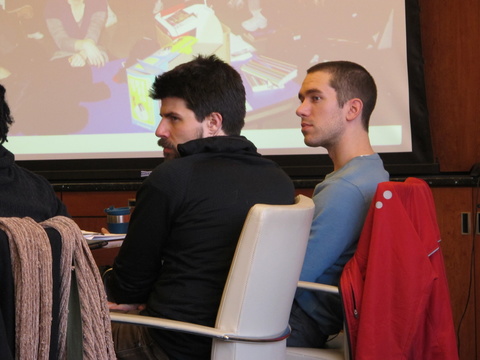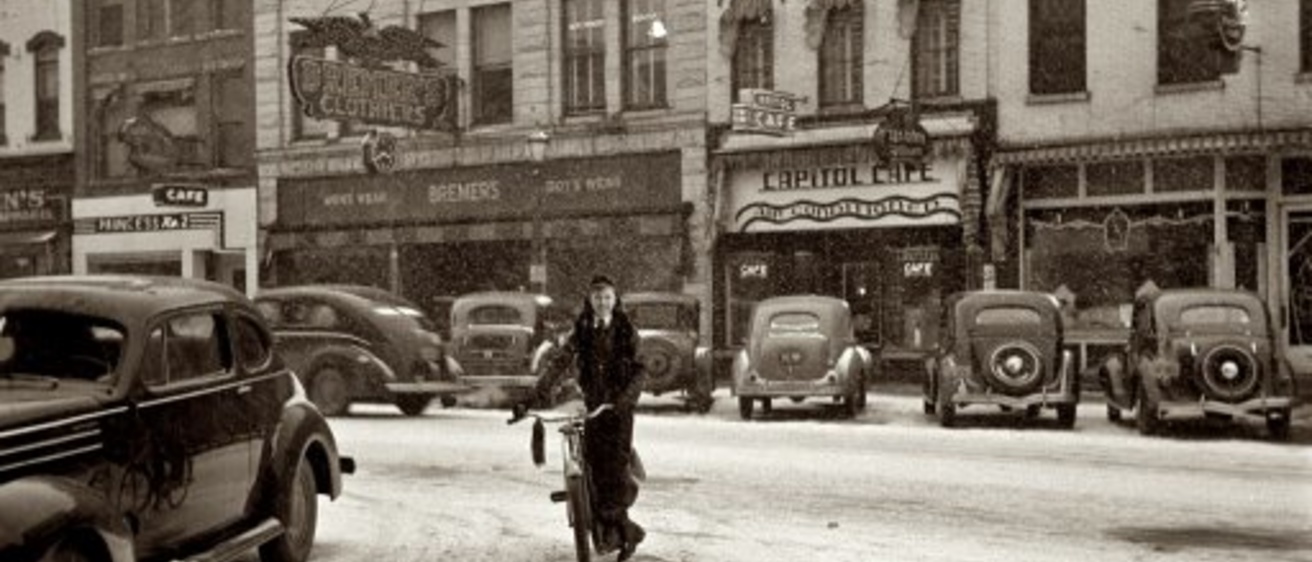Winter Biking Not Just for the Strong and the Fearless

Mark Pooley jokes that many people think that winter bike riding is only for the “strong and the fearless.” As someone who rides his bike most days, he acknowledges that even the strong and fearless sometimes look outside on a zero-degree wind chill morning and have second thoughts about riding to work. But what the former Obermann Graduate Fellow and current PhD student in Public Health believes is that if more people tried riding their bikes in inclement weather, they might just get the hang of it.
As the president of the University of Iowa’s Bicycle Advisory Committee, Pooley (pictured in the dark sweater at the left with another Graduate Fellow and winter bicyclist, Jake Kruczek) is part of the group behind the current Winter Warrior Bike Challenge. The three-week challenge encourages members of the UI community to cycle to campus between December 1 and 20th, unless ice, white-out conditions, or illness deter them. Currently, seventy-five people are signed up for the challenge, which asks participants to log their mileage online. Those with the highest miles will receive prizes from local cycling retailers.
Generating Data from Bikers
Pooley is especially interested in the possibility of the event and others like it (the organization sponsored a commuter challenge last spring) to generate data that will help researchers to create circumstances that will encourage more people to cycle. Pooley completed his Master’s in Urban and Regional Planning last year and is now studying travel behavior. This field focuses on where a person or population goes, for what purpose, and using what mode. What influences those choices is called behavioral economics and can include, in the case of cycling, employer incentives, better accommodations for bicycles, and yes, even prizes for riding on wintry days.
Pooley is interested in crowdsourcing data gathered from social media or smart phone applications to answer those questions of how, when, and why people choose to bicycle. The data will help communities plan bicycle infrastructure more effectively and efficiently.
Bike-Friendly Initiatives
The Bicycle Advisory Committee, which is affiliated with the Office for Sustainability and the UI Staff council, is already trying to improve this infrastructure locally. The group is pushing to improve how parking for bikes is incorporated into new buildings. Covered or heated parking make cycling more appealing and should, the group has advocated, be part of any new housing development on campus. Pooley also credits Liz Christiansen, Director of the Office of Sustainability, for spearheading a movement to get bike sharing on campus.
Pooley said that the Bicycle Advisory Committee, which was started two years ago and is comprised of a good mix of students, staff, and faculty, echoes what he learned at the Obermann Graduate Institute last January regarding collaboration. “One of the many aspects the Obermann Institute emphasized was building partnerships with mutually beneficial goals in mind,” says Pooley. “Working to improve bikeability at the University of Iowa would be a daunting task for an individual, but working with a group to develop practical and realistic ideas and solutions makes this objective attainable.” Even when it’s dauntingly cold outside.
